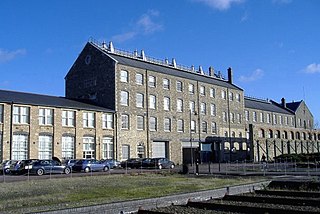Related Research Articles

Genealogy is the study of families, family history, and the tracing of their lineages. Genealogists use oral interviews, historical records, genetic analysis, and other records to obtain information about a family and to demonstrate kinship and pedigrees of its members. The results are often displayed in charts or written as narratives. The field of family history is broader than genealogy, and covers not just lineage but also family and community history and biography.

The New General Catalogue of Nebulae and Clusters of Stars is an astronomical catalogue of deep-sky objects compiled by John Louis Emil Dreyer in 1888. The NGC contains 7,840 objects, including galaxies, star clusters and emission nebulae. Dreyer published two supplements to the NGC in 1895 and 1908, known as the Index Catalogues, describing a further 5,386 astronomical objects. Thousands of these objects are best known by their NGC or IC numbers, which remain in widespread use.

The Society of Genealogists (SoG) is a UK-based educational charity, founded in 1911 to "promote, encourage and foster the study, science and knowledge of genealogy". The Society's Library is the largest specialist genealogical library outside North America. Membership is open to any adult who agrees to abide by the Society's rules and who pays the annual subscription. At the end of 2010, it had 11,014 members.
A finding aid, in the context of archival science and archival research, is an organization tool, a document containing detailed and processed metadata and other information about a specific collection of records within an archive. Finding aids often consist of a documentary inventory and description of the materials, their source, and their structure. The finding aid for a fonds is usually compiled by the collection's entity of origin, provenance, or by an archivist during archival processing, and may be considered the archival science equivalent of a library catalog or a museum collection catalog. The finding aid serves the purpose of locating specific information within the collection. The finding aid can also help the archival repository manage their materials and resources.

The Société de l'histoire de France (SHF) was established on 21 December 1833 at the instigation of the French minister of Public Instruction, François Guizot, in order to contribute to the renewal of historical scholarship fuelled by a widespread interest in national history, typical of the Romantic period. On 31 July 1851 it was approved by President Louis-Napoléon Bonaparte as being of public interest. For over 175 years, the SHF has been one of the main forces in the publishing of texts and documents on French history. Many leading French historians of the 19th and 20th centuries have been elected to its annual presidency. Its field was initially limited to the period before 1789, but the SHF later absorbed the Société d'histoire contemporaine (1927).
Archival processing is the act of surveying, arranging, describing, and performing basic preservation activities on the recorded material of an individual, family, or organization after they are permanently transferred to an archive. A person engaging in this activity is known as an archival processor, archival technician, or archivist.

A text publication society is a learned society which publishes scholarly editions of old works of historical or literary interest, or archival documents. In addition to full texts, a text publication society may publish translations, calendars, and indexes.
The patent rolls are a series of administrative records compiled in the English, British and United Kingdom Chancery, running from 1201 to the present day.

The Historic England Archive is the public archive of Historic England, located in The Engine House on Fire Fly Avenue in Swindon, formerly part of the Swindon Works of the Great Western Railway.
The British Record Society is a British learned society that focuses on publishing historic records, or, more specifically, indexes to such records. In recent years, the Society has concentrated on the publication of name indexes to English probate records, and the texts of 17th-century Hearth Tax returns.

The Royal Commission on Historical Manuscripts, was a United Kingdom Royal Commission established in 1869 to survey and report on privately owned and privately held archival records of general historical interest. Its brief was "to make inquiry as to the places in which such Manuscripts and Papers were deposited", and to report on their contents. It remained in existence until 2003, when it merged with the Public Record Office to form The National Archives. Although it technically survives as a legal entity, its work is now entirely subsumed into that of The National Archives.

Local history is the study of history in a geographically local context, often concentrating on a relatively small local community. It incorporates cultural and social aspects of history. Local history is not merely national history writ small but a study of past events in a given geographical area which is based on a wide variety of documentary evidence and placed in a comparative context that is both regional and national. Historic plaques are one form of documentation of significant occurrences in the past and oral histories are another.

Archival research is a type of research which involves seeking out and extracting evidence from archival records. These records may be held either in collecting institutions, such as libraries and museums, or in the custody of the organization that originally generated or accumulated them, or in that of a successor body. Archival research can be contrasted with (1) secondary research, which involves identifying and consulting secondary sources relating to the topic of enquiry; and (2) with other types of primary research and empirical investigation such as fieldwork and experiment.

Sir Henry Churchill Maxwell Lyte was an English historian and archivist. He served as Deputy Keeper of the Public Records from 1886 to 1926, and was the author of numerous books including a history of Eton College.
The United Kingdom Census of 1881 recorded the people residing in every household on the night of Sunday 3 April 1881, and was the fifth of the UK censuses to include details of household members.
A calendar is, in the context of archival science, textual scholarship, and archival publication, a descriptive list of documents. The verb to calendar means to compile or edit such a list. The word is used differently in Britain and North America with regard to the amount of detail expected: in Britain, it implies a detailed summary which may be used as a substitute for the full text; whereas in North America it implies a more basic inventory.
The Record Commissions were a series of six Royal Commissions of Great Britain and the United Kingdom which sat between 1800 and 1837 to inquire into the custody and public accessibility of the state archives. The Commissioners' work paved the way for the establishment of the Public Record Office in 1838. The Commissioners were also responsible for publishing various historical records, including the Statutes of the Realm to 1714 and the Acts of Parliament of Scotland to 1707, as well as a number of important medieval records.

John Clement Fitzpatrick was an archivist and an early American historian, widely regarded as an authority on George Washington. He was noted for his groundbreaking work editing Washington's diaries and many letters and documents. Appointed by the George Washington Bicentennial Commission he prevailed over the editorship in his acclaimed 39 volume work, The Writings of George Washington, published between 1931 and 1944. His involvement during this prolonged effort set many of the standards for the management of manuscripts in the Library of Congress. Fitzpatrick died before all the volumes had been published. He belonged to a number of historical societies while also earning honorary degrees from several prominent universities. Fitzpatrick's years of correspondence and other records have provided historians with valuable sources of information on the life of and events surrounding George Washington, and on the history of Washington, D.C. for that era.
The Military Historical Society of Australia (MHSA) is a voluntary organisation formed in 1957, focused upon promoting research and study of Australia's military history. Administered by a federal council based in the Australian Capital Territory, the society has state and regional branches in all states of Australia, except New South Wales, which split from the organisation in 1968. The society has published a quarterly journal, Sabretache, continuously since mid-1958.
The Australian Joint Copying Project (AJCP) was a National Library of Australia and State Library of New South Wales led initiative to microfilm archives and records from the United Kingdom and Ireland relating to Australia and the Pacific.
References
- ↑ "About the List and Index Society". List and Index Society. Retrieved 8 May 2014.